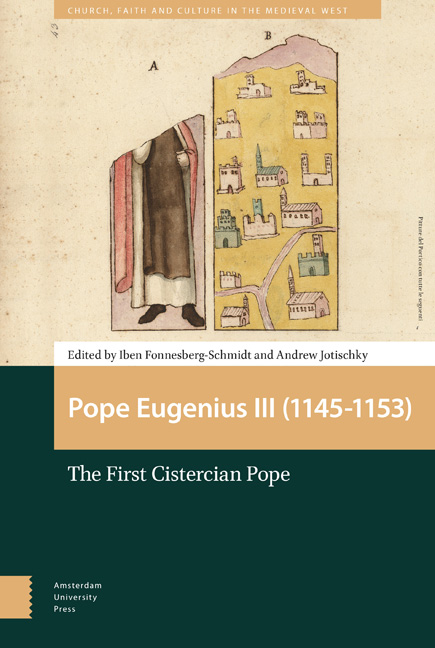Book contents
- Frontmatter
- Contents
- Preface
- Abbreviations
- Maps and Figures
- Introduction
- 1 ‘Justinian’s Laws, not the Lord’s’: Eugenius III and the Learned laws
- 2 Curial Politics and Papal Power : Eugenius III, the Curia, and Contemporary Theological Controversy
- 3 The Cistercians, Eugenius III, and the Disputed York Election
- 4 Eugenius III and the Crusades to the East
- 5 Eugenius III and the Northern Crusade
- 6 The Benefits of Exile
- 7 Eugenius III and France: the Protected Protector
- 8 A Golden Rose and the Deaf Asp that Stoppeth her Ears: Eugenius III and Spain
- 9 Eugenius III and the Roman Commune
- 10 Eugenius III Reclaims the Patrimony of St Peter
- 11 Eugenius III’s Privileges to Cistercian Houses
- 12 Eugenius III at Cîteaux, 1147
- 13 Eugenius III and the Church in the Crusader States
- Index
9 - Eugenius III and the Roman Commune
Published online by Cambridge University Press: 22 December 2020
- Frontmatter
- Contents
- Preface
- Abbreviations
- Maps and Figures
- Introduction
- 1 ‘Justinian’s Laws, not the Lord’s’: Eugenius III and the Learned laws
- 2 Curial Politics and Papal Power : Eugenius III, the Curia, and Contemporary Theological Controversy
- 3 The Cistercians, Eugenius III, and the Disputed York Election
- 4 Eugenius III and the Crusades to the East
- 5 Eugenius III and the Northern Crusade
- 6 The Benefits of Exile
- 7 Eugenius III and France: the Protected Protector
- 8 A Golden Rose and the Deaf Asp that Stoppeth her Ears: Eugenius III and Spain
- 9 Eugenius III and the Roman Commune
- 10 Eugenius III Reclaims the Patrimony of St Peter
- 11 Eugenius III’s Privileges to Cistercian Houses
- 12 Eugenius III at Cîteaux, 1147
- 13 Eugenius III and the Church in the Crusader States
- Index
Summary
Abstract
Eugenius III began his pontificate facing a newly formed Roman commune in open rebellion, determined to wring political concessions from the papacy. He reached agreement with the commune on at least two occasions but found it impossible to find a lasting compromise. This chapter investigates to what extent Eugenius's troubles were a legacy of the Schism of 1130 and assesses his success in marginalizing the commune during the politically charged negotiations for the abortive imperial coronation of Conrad III, only to see it reinvigorated by the preaching of Arnold of Brescia, sent to Rome by Eugenius as a penance. His new palace at St Peter's brought the papacy closer to the abitato in the Tiber Bend where the majority of Romans lived.
Keywords: Otto of Freising; Tivoli; Tre Fontane; Giovanni Paparo; Patricius; Arnold of Brescia; Wibald of Stavelot and Corvey; Boso
Eugenius III is often presented simply as one in a succession of undistinguished popes between the death of Innocent II (1130–43) and the accession of Adrian IV (1154–9). His election is ascribed to the unwarranted influence on the papal Curia of Bernard of Clairvaux while his long absences from Rome are interpreted as signs of weakness and vacillation in the face of the growing power of a popular commune. Eugenius has been misrepresented and misunderstood precisely because the Roman context of his pontificate has been ignored; historians have too readily accepted a conventional view of Roman politics in the 1140s and have in consequence judged Eugeniusunfavourably. Almost twenty years ago, Adriaan Bredero presented a controversial interpretation of Roman affairs, which is mistaken on many key points.
On the election, for example, Bredero insisted that the electors had chosen Eugenius because they believed that he alone could put an end to the Roman rebellion. He would have been able to do this because his election would have led inevitably to the involvement in Roman affairs, first of St Bernard and then of the emperor-elect Conrad III (1138–52), over whom Bernard exerted great influence, and he would have come to Rome and restored order.
- Type
- Chapter
- Information
- Pope Eugenius III (1145–1153)The First Cistercian Pope, pp. 243 - 270Publisher: Amsterdam University PressPrint publication year: 2018



